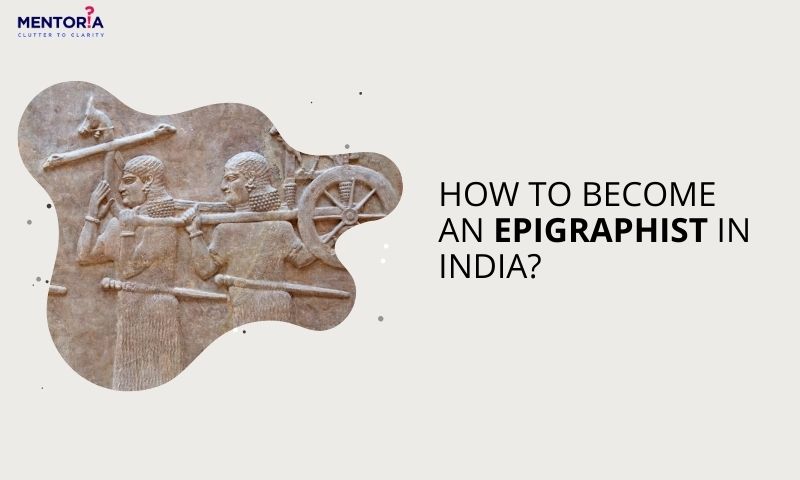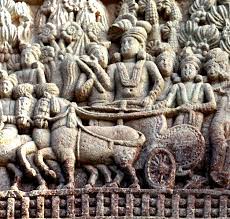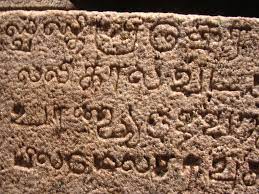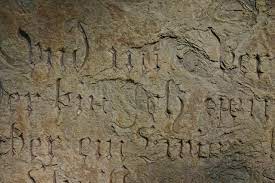How to Become an Epigraphist in India?

Are you fascinated by the mystery of ancient inscriptions or the glorious whispers of history etched in stone? Have you ever found yourself lost in the cryptic puzzle inscribed on the temple walls, and you wondered about the stories they hold? If so, and also if you are someone who is not charmed by traditional careers like engineering, law, or medicine, then the path of an epigraphist could be a journey meant for you.
What is Epigraphy?
Before delving into the journey of becoming an epigraphist, let’s understand this term in a better way. Epigraphy is the study of inscriptions, which is all about deciphering, interpreting, and analysing ancient writings engraved on various surfaces such as stone, metal, clay, or even paper. These inscriptions serve as invaluable clues to uncover human history, shedding light on cultural, linguistic, religious, and political aspects of bygone eras.
The Importance of Epigraphists
In layman’s language, we can say that the epigraphists are the detectives of history who have linguistic knowledge and archaeological acumen. They play a crucial role in preserving and decoding the invaluable heritage of ancient civilisations. For example, consider the discovery of the Rosetta Stone—a breakthrough moment in the field of epigraphy. This ancient artefact, inscribed with the same text in three scripts—Hieroglyphic, Demotic, and Ancient Greek—proved instrumental in deciphering Egyptian hieroglyphs, unlocking a treasure trove of knowledge about ancient Egypt.
So, we can easily say that by deciphering inscriptions, epigraphists rediscover lost languages, reconstruct forgotten narratives, and piece together the puzzle of our past. Their work not only enriches our understanding of history but also contributes to cultural preservation and heritage conservation efforts. Now, that sounds like a very important job, right?
How to Become an Epigraphist in India?
Now that the allure of epigraphy has captured your imagination, how can you embark on the journey to become an epigraphist in India? Let’s straighten out the path for you.
Education
If you are in class 10 and considering becoming an epigraphist, then it will help if you take up Humanities in classes 11th and 12th, with history and geography as one of the subjects. This will help you build a solid foundation for your higher studies. Although not mandatory, a science or commerce student can also make a switch at the undergraduate level.
Afterward, you should do a Bachelor’s degree in Archeology, History, Epigraphy, Art History, or any other allied discipline. Renowned institutions like BHU and Punjab University, Chandigarh offer courses that will help you provide a comprehensive understanding of ancient inscriptions.
Then, doing a Master’s and specialising in a particular era, civilisation, or script is something that will give you a solid holding as a professional. A post-grad is an unsaid rule if you want to make a mark in the field of Epigraphy. It adds depth to your expertise.
However, if you want to get into academia for teaching or research purposes, which is the preferred path of most students in this field, then you must take the UGC NET exam after your Master’s degree and pursue a PhD.
Hands-on Experience
Gaining practical experience through internships, fieldwork, or collaborative projects with archaeological teams will make you stand apart when starting out. Organisations such as the Archaeological Survey of India offer internship opportunities for aspiring epigraphists to participate in excavation and documentation projects, honing their skills in inscription analysis.
Language Proficiency
Besides the formal education path, mastering ancient languages is one of the essential skills for an epigraphist. For example, the Dravidian script found in Tamil Nadu’s Pallava inscriptions requires proficiency in Tamil and knowledge of ancient Tamil literature. Similarly, Sanskrit inscriptions necessitate a strong command of the Sanskrit language. Ideally, Sanskrit would be ideal as you kickstart your epigraphy journey, given this language is the base of most ancient languages in inscriptions.
Technological Tools
It would be best if you also embraced modern technological tools such as photogrammetry, laser scanning, and digital imaging to enhance your epigraphic studies. These tools complement traditional methods, making inscription documentation and analysis more efficient and accurate.
Opportunities for Indian Epigraphists
The journey of an Indian epigraphist is not merely for the pursuit of knowledge but also a gateway to diverse career opportunities. Here are some avenues where Indian epigraphists can make their mark:
Academic Institutions
As mentioned above, this field is the most sought-after choice of epigraphists worldwide. Universities, research institutes, and museums often employ epigraphists for research, teaching, and curation of historical collections. For instance, the Centre for Epigraphy and Palaeography at the University of Hyderabad offers research opportunities in South Indian epigraphy.
Archaeological Departments
Apart from various universities, Governmental and non-governmental organisations engaged in archaeological exploration and conservation require the expertise of epigraphists for inscription documentation and analysis. Projects such as the ongoing excavation at Hampi by the Karnataka State Department of Archaeology and Museums provide opportunities for epigraphic research.
Cultural Heritage Management
Epigraphists play a vital role in cultural heritage management projects, contributing to the preservation and interpretation of historical sites and artefacts. Organisations like the Indian National Trust for Art and Cultural Heritage (INTACH) collaborate with epigraphists to conserve heritage sites across India.
Consultancy Services
Private consultancy firms specialising in heritage conservation, archaeology, and cultural tourism often seek the expertise of epigraphists for various projects. For example, Heritage Preservation Atelier offers such services for documenting and preserving heritage scribes.
International Collaborations
Indian epigraphists also have opportunities to collaborate on international research projects, participate in conferences, and contribute to global efforts in deciphering and preserving world heritage. Collaborative initiatives such as the Indo-French Epigraphical Mission in Tamil Nadu facilitate cross-cultural exchange and research collaboration. In addition to that, there is also demand for Indian epigraphists in European job markets, like German Universities, where they continuously do extensive research on ancient languages like Sanskrit.
Challenges for an Epigraphist
While the journey of becoming an epigraphist in India is rewarding, it’s not without its challenges. And for students who want to take it up as a career, they should be aware of these challenges. Let’s understand a few of them.
- Limited Resources: Access to resources such as archival materials, funding for research, and advanced technology can be limited, especially in remote areas.
- Language Barriers: Deciphering ancient scripts requires proficiency in languages that may not be widely taught or understood, posing a significant challenge for aspiring epigraphists. For example, deciphering the Brahmi script used in ancient Indian inscriptions requires expertise in linguistics and palaeography.
- Conservation Concerns: Preserving inscriptions is crucial for their study, yet many historical sites face threats from urbanisation, vandalism, and environmental degradation.
- Interdisciplinary Expertise: Epigraphy requires interdisciplinary knowledge encompassing history, archaeology, linguistics, and technology, demanding continuous learning and collaboration.
- Career Uncertainty: While opportunities exist, and a lot of traction has been seen in this field in the last few years, epigraphy in India may still lack formalised career paths. This may lead to uncertainty, especially for aspiring professionals. Also, establishing a career as an independent epigraphist may require entrepreneurship and networking skills to secure research grants and consultancy projects.
Dig Into The Past, Live Your Future Career
Having said that, an epigraphist is generally fuelled by curiosity, passion, and dedication, and their journey takes them through the corridors of time, discovering the secrets of civilisations long past. And so despite the challenges, the rewards are abundant—a deeper understanding of history, a sense of cultural heritage, and the satisfaction of preserving the legacy of our ancestors. So, if you think this might be your calling, or you want to know about more exciting career options that fit your personality and interests, then Mentoria can help you in your quest. Just reach out to us, and we will take care of the rest.









